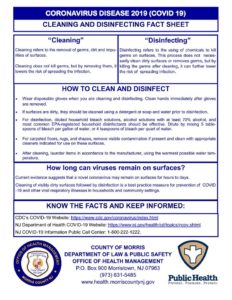The Coronavirus outbreak is the perfect example of how change management permeates everyone’s lives, not only in Corporate projects. Whether you are sick with the virus or want to take precautionary measures to avoid getting sick, you are dealing with a change management situation.
Here are some tips for how you can use your change management skills to help you navigate through this outbreak situation:
1. Strategic Planning and Analysis
One of the most important aspects of any change management project is the strategic planning aspect. In this context, here is a quick planning checklist idea:
- Collect reliable information about the outbreak so that you can communicate clearly with kids & family.
- Gather data. In the context of the coronavirus, gather data on how to deal with the infestation effectively. You need this information to create your household rules outlined below in “d.” Here is a guideline summary provided by the Morris County Office of Emergency Management
- Work on your budget. What costs could you cut to ease your finances for a few weeks to a couple of months?
- Define the new rules of engagement. In the coronavirus context, define rules in line with I) what’s needed to prevent the disease and II) what’s going to happen if someone catches the virus.
- Think about how to engage the entire team or family, so that everyone is aligned with the goals and the rules.
- Plan a reward and celebration system
2. Communication: Providing clear instructions
After your planning time, you need to make sure you give clear communication and guidance to your team or family members. In the context of the coronavirus, here is an outline to help you script your narrative. But you can use similar structure for any context.
- Share why this is happening. You can be more scientific and share information of how it all started in China, or you can share a religious belief you and your family have. Share according to what’s in line with your values.
- Tell them how you expect them to react and act. When people are afraid – and consciously or unconsciously, we are all afraid of the CoronaVirus – they disconnect from their thinking brain and react based on the primitive brain — disconnecting from the frontal cortex when under stress is normal. This is why it is essential to tell them what you expect of them. It’s easier for people because it becomes a no-brainer when they know what to do.
- Inform them step by step what the new rules are both for prevention, and if someone catches the disease.
- Engage them by sharing the reward and celebration system and asking them for ideas about how we can make this time be more Fun for everyone.
3. Target the right audience: Start at the top
In any change management situation, you always start at the top. You plan, communicate, and engage your most senior talents and leaders first. In line with this, you should do the same in this context. Start by aligning and engaging with the primary household providers. They must be 100% in agreement with the new rules and how everything is going to be communicated and dealt with.
Studies show that when top management is not 100% aligned, success rates of the change management project are significantly low. Don’t fall for this mistake. If you live in a multi-generational home, make sure the great parents are especially onboard with the rules. Seniors need to clearly understand what are the consequences if they catch the disease. Don’t sugarcoat here. They must know exactly what will happen to the household routine, to the household finances, and the household emotional state. This will help them be more compliant. Sharing how long this situation is expected to last also helps manage everyone’s anxiety. If you don’t know how long, estimate it. If you can’t figure it, get someone else’s best guess.
From the senior’s perspective, they don’t have many more years to live. Every minute counts for them. Telling them they will have to be apart from their grandchildren is taxing. But if you reframe the situation saying that if something happens to them and they are no longer here, and how taxing this will be on the children, this might give them a different perspective.
4. Leadership: Involving every layer
The most prominent mistake people and corporations make is not involving all layers. By all layers, we mean every single type of member. In this context, it is persistent that families don’t explain things to their 3-year-old or their 90-year-old members.
The way you explain what is going on and what is expected from them may differ, but you need to do it nevertheless. Why? Because they are not stupid, and they will notice something different is going on. And if you let them assume and create their own stories, this will only generate elevated stress. You don’t want your household members to be stressed because higher stress levels make people more vulnerable to any disease. And, just because everyone deserves fair and square communication.
5. Managing resistance: Training, Coaching, Encouraging, Rewarding, Having Fun
In the current pandemic context, resistance will be the most challenging aspect leaders will face. In your setting, you may encounter resistance of the seniors not wanting to keep the distance from their grandchildren. Or your children not being allowed to play with the other kids in the street and trying to sneak out. Or the new cleaning rules of the house being overlooked.
Dealing with resistance is always the most difficult aspect, so you are not alone. You can use Coaching Expatriate’s FRECT™ methodology: What the FRECT are you doing? FUN, REWARD, ENGAGE, COACH, TRAIN.
FUN: make things Fun. Be creative about how the rules apply. You can create a competition or assignments for your kids that are fun. It could be as simple as asking them to create a video about their experience, and then watching the experience at the end of the day and voting about (fill in the blanks). Or you can play video games. Treasury hunts. Storytelling. Theather and/or puppet theater. Fashion design. New furniture ideas. DIY projects. See what works for you and your family. What works for you is best for you.
REWARD: humans and animals love rewards. Studies show that when reward systems are in place, performances are higher. It’s not about the “bribe,” it’s about acknowledging that they are doing what is expected, or doing it well. It could be food; it could be money; it could be play-time. Every person has different interests and perceives rewards differently. You know your family the best.
ENGAGE: Just communicating and sharing the rules will not cut it. If everyone is not engaged, they are not on board. If they are not on board, your chances of success will be limited. Engaging your household members means making them committed to the cause. Engagement tactics include: clearly sharing the why, connecting the change with their emotions, sharing with them the cost of what will happen if they don’t make the changes. When I was a child, I got measles and wanted to see my grandmother. I threw a fit. When I was calmly asked, “How sad would you be if you saw your grandma right now, and she caught your measle and died? As you know, measles are deadly to the elderly.” I remember saying, “I would be devastated.” And then my mom engaged me further, saying, “write a cute letter. I will make sure she gets it today.” Nowadays we have face time. But the concept still applies.
COACH: guiding people step by step and helping people realize what’s going on with their feelings, and how much progress they are making is part of the game. Once again, be creative. Count how many days your family is resilient. Ask your children to find out zombie movies to watch together. Ask them how the film relates to their current situation and what they can learn from this situation. Take this situation as an opportunity to learn and help everyone learn.
TRAIN: training personnel is an essential aspect of any change management project. Train your kids on how to clean the surfaces, how to wash their hands, etc. Don’t just tell them what to do. Show them how to do it.
Changes are transitory. How you face changes is what differentiates successful and happy people. Be positive and take this head-on.
A transmission electron microscope image of a coronavirus.
(Image: © Cavallini James/BSIP/Universal Images Group via Getty Images)
Did you like this post? Write to us, telling us what other articles would you like to see here. Consider subscribing to our newsletter. We send one email every week with productivity tips, habits hacks, and leadership skills geared toward first-time global leaders.










